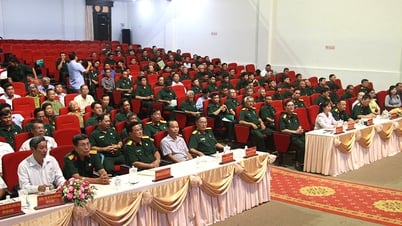
The Ministry of Home Affairs is seeking comments on the draft Law on Cadres and Civil Servants (amended). According to current law, rank is the name that shows the rank in capacity and professional qualifications of civil servants. Appointment is when cadres and civil servants are decided to hold a leadership or management position or a rank according to the provisions of law.
However, in the draft expected to be submitted to the National Assembly in May, the Ministry of Home Affairs proposed to remove all regulations on civil servant ranks (Articles 42 to 46), instead, the Government will manage according to job positions.
Specifically, the system of civil servant job positions is ranked according to hierarchy; showing different levels of job nature; requirements for corresponding competency framework. On that basis, agencies recruit, evaluate, use, manage civil servants and pay salaries according to the principle of "working in a job position, receiving the corresponding salary of that job position".
In addition, the determination of the rank of a job position is based on the standards of the position, title, job description and organizational structure of the agency, organization or unit. When a civil servant changes his/her job position, he/she will receive salary and related benefits according to the new job position. The specific content will be assigned to the Government for regulation.
Regarding classification, civil servant job positions include: leadership, management; professional, technical; support, service. Compared to current regulations, the bill removes "shared expertise". For support and service positions, civil servant management agencies can sign labor contracts to implement them.
Management agencies may sign labor contracts with talented people, experts, and scientists to perform certain specialized and professional tasks to meet task requirements.
For cadres, the classification includes job position; position and title standards; duties, powers and responsibilities. The job position of cadres will be regulated and guided by the competent Party agency.
Principles, methods, procedures, job descriptions, competency frameworks of job positions; job position system; responsibilities, authority to appraise, approve, and issue job positions; and management of civil servant jobs are expected to be assigned by the National Assembly to the Government to prescribe.
The drafting agency believes that the current law stipulates the principle of managing cadres and civil servants as a combination of title standards, job positions and staffing quotas. The use, assessment and classification of the quality of cadres and civil servants must be based on political qualities, ethics and capacity to perform public duties, which is not entirely based on job positions.
At the same time, the concept of job position in the law is a job associated with the title, position, structure and civil servant rank to determine the payroll and arrange and use civil servants, leading to the implementation of determining and describing job positions overlapping with civil servant rank standards. These standards are unclear about the requirements for results and work products, so many problems arise in practice, not meeting the requirements of streamlining payroll and restructuring, improving the quality of civil servants according to the current policies of the Party and State.
TB (according to VnExpress)Source: https://baohaiduong.vn/bo-noi-vu-de-xuat-bo-ngach-cong-chuc-408945.html



![[Photo] President Luong Cuong attends the inauguration of the international container port in Hai Phong](https://vphoto.vietnam.vn/thumb/1200x675/vietnam/resource/IMAGE/2025/5/13/9544c01a03e241fdadb6f9708e1c0b65)



![[Photo] Prime Minister Pham Minh Chinh meets with US business representatives](https://vphoto.vietnam.vn/thumb/1200x675/vietnam/resource/IMAGE/2025/5/13/5bf2bff8977041adab2baf9944e547b5)























































































Comment (0)